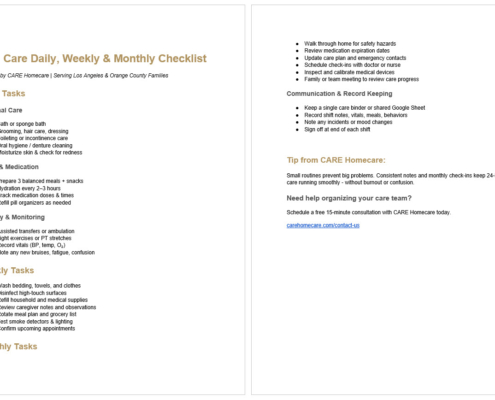Posts

Printable 24/7 Care Checklist PDF - Daily, Weekly and Monthly Tasks
When your loved one requires 24-hour care, it can feel like the world suddenly runs on alarms, pillboxes, and endless to-do lists. But with a clear routine, even complex care schedules become manageable.
Whether you’re overseeing a professional care team or sharing shifts among family, this guide helps you stay organized, reduce burnout, and prevent small issues from turning into emergencies.

A Family Guide to Home Care After Hospital Discharge
Leaving the hospital after surgery or illness should feel like a victory. The truth is it begins a delicate phase where recovery can falter without the right support. Hospitals release people when they are medically stable, not when they are fully healed. Families suddenly face a steep learning curve with discharge instructions, new medications, wound care instructions from clinicians and fragile mobility. The margin for error is small. Many patients return to the hospital within days because of preventable issues like poor nutrition, falls, medication confusion or skipped follow up appointments.
This is where professional home care after hospital discharge changes the outcome. By closing the gaps between medical orders and daily life, caregivers keep recovery on track, reduce stress for families and help patients regain independence in a safe and structured way.
This guide draws on years of experience supporting families in Los Angeles and Orange County. It explains what happens after discharge, why home care matters and how a structured plan prevents readmission.

The Emotional Shock of Coming Home From the Hospital
For many families, the day of discharge is celebrated as a milestone. It represents progress, healing and relief. Yet what often follows is an unexpected emotional shock. Patients and loved ones move from an environment of constant medical supervision to the quiet of their own home. The contrast can be jarring. Instead of nurses checking vitals at all hours, there is silence. Instead of immediate answers to questions, there is uncertainty.
As experts in home care services, we see this emotional shock frequently. Families expect recovery to feel smooth once they are home. In reality, the first days often bring anxiety, fear of relapse and a sense of being abandoned after the safety net of hospital care disappears. This transition is as much emotional as it is physical. Recognizing and addressing these feelings is essential for a safe and confident recovery.

Why Discharge Planning Starts Before You Leave the Hospital
Leaving the hospital after surgery, an illness, or an emergency admission is a milestone. Families often assume it means the hardest part is over. In truth, the first days and weeks at home are some of the most fragile. The risk of complications, falls, and readmissions is at its peak. That is why discharge planning should not wait until the last morning on the ward. It should begin as soon as hospitalization does.
As expert home care providers in Los Angeles and Orange County, we see the same challenge again and again. Families get a stack of discharge papers, instructions they barely have time to process, and the responsibility to carry them out without professional help. When discharge planning starts early and includes a trusted home care agency, outcomes improve. Healing becomes smoother, families feel less overwhelmed, and the chance of a return trip to the hospital is significantly reduced.

Discharge Instructions Explained - A Caregiver’s Guide to Safer Recovery at Home
Leaving the hospital should bring relief but for many families it also brings confusion. Every patient leaves with discharge paperwork, often a stack of forms that mix clinical language with hurried notes. These documents are not a formality. They are the blueprint for recovery.
Misreading or overlooking even one section can cause setbacks. Missed doses, skipped follow ups or uncertainty about wound care are common reasons for complications and hospital readmission. Understanding discharge paperwork is not optional. It is the first and most important step in recovery at home.

Preventing Readmission After Surgery - What Families Often Miss
Coming home after surgery should feel like a victory. In truth, it is the beginning of a fragile phase where every detail matters. Hospitals discharge people once they are stable enough to leave, not fully healed. The first days and weeks at home involve new routines, new medications, physical limitations, and emotional stress. That combination makes this period one of the riskiest times for hospital readmission.
The reality is many of these readmissions are avoidable. Families often underestimate the daily challenges of recovery. Meals get skipped or lack protein. Prescriptions pile up and confusion sets in. A trip to the bathroom at night leads to a fall. Appointments are missed because getting to the car is too exhausting. Each gap seems small but together they add up.
At CARE Homecare, we specialize in closing those gaps. As a trusted home care provider in Los Angeles and Orange County, our caregivers support families through this delicate transition. By focusing on daily life—nutrition, mobility, medication reminders, safety, and companionship—we reduce the risks that commonly send people back to the hospital.

The First 72 Hours at Home After Hospital Discharge
Leaving the hospital is often a moment of relief, but it can also be the start of a fragile period. The first 72 hours at home after hospital discharge are critical. Families quickly discover that recovery does not begin and end at the hospital door. In fact, research shows that nearly 20% of Medicare patients are readmitted within 30 days of discharge, often due to preventable complications.
This transition is where in-home care proves invaluable. At CARE Homecare, we have seen how structured support during the first three days can stabilize routines, reduce risks and bring peace of mind to families.

Why Dementia Patients Thrive with In-Home Memory Care
Caring for someone with dementia can be deeply emotional, especially as memory loss and cognitive changes begin to reshape daily life. The condition often brings confusion, personality shifts, and difficulty with once-routine tasks. These changes can leave families feeling overwhelmed, unsure of how best to help their loved one maintain quality of life.

A Comprehensive Guide for Dementia Care Caregivers
Learn essential strategies for providing compassionate and effective dementia care with this comprehensive guide. Explore ways to create structured daily routines, improve communication, enhance home safety, address behavioral challenges, and prioritize caregiver well-being to support both patients and their loved ones.

How to Choose a Home Care Agency
Discover how to choose the right home care agency for your loved ones. Learn key factors like caregiver expertise, agency credentials, costs, and communication to make an informed decision for their safety and comfort.
